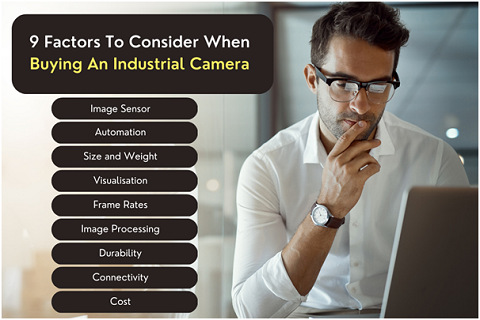Industrial cameras are increasingly crucial components in manufacturing and other industrial processes. They are used to monitor and control production processes, safety systems, and other automated processes.
Choosing the right industrial camera requires careful consideration of a range of factors, such as:
1. Image Sensor
The image quality generated by an industrial camera is highly dependent on the type and quality of the imaging sensor used. Test the industrial camera you want before purchasing it.
2. Automation
Most industrial cameras come with a range of built-in automation capabilities to enable quick setup and operation. Consider the level of negotiation and automation for your process and ensure the camera has the features that best meet your needs.
3. Size and Weight
These cameras come in a variety of sizes and weights. You should consider the size and weight of the camera that best fits your requirements, depending on the size and reach of the industrial process.
4. Visualisation
Depending on the industrial process, you may want to consider the visualisation features such as zoom, pan, and tilt. Having the ability to move the camera and zoom into areas of interest can provide a complete picture of your process.
5. Frame Rates
A high speed camera is designed to capture very high-speed processes. Ensure the camera is capable of capturing the desired speed of events that you need to be able to monitor and analyse.
6. Image Processing
Most cameras come with image processing capabilities that enable the user to adjust the brightness, contrast, and other features to make it easier to capture the necessary data. Consider the level of image processing you will need and ensure the camera can deliver these functions.
7. Durability
Industrial cameras must reliably operate in a range of industrial environments and conditions. Ensure the industrial camera is rated to operate in extreme temperature ranges, dust, and moisture and that it can stand against shock and vibration.
8. Connectivity
Consider the type of connectivity options you require for your industrial cameras, such as Ethernet, USB, or Wi-Fi. Ensure the camera has the connectivity options that best fit your needs since it can impact how easily and quickly you can transfer data.
9. Cost
Industrial cameras come in a wide range of prices, and it’s crucial to consider the cost concerning your budget and the required performance. Determine your budget and research the features and performance needed to meet your needs within that budget, as some features and capabilities may come at a higher cost.
Start your search for an industrial camera for your business by checking out Voltrium Systems! Visit their website today if you are interested!





